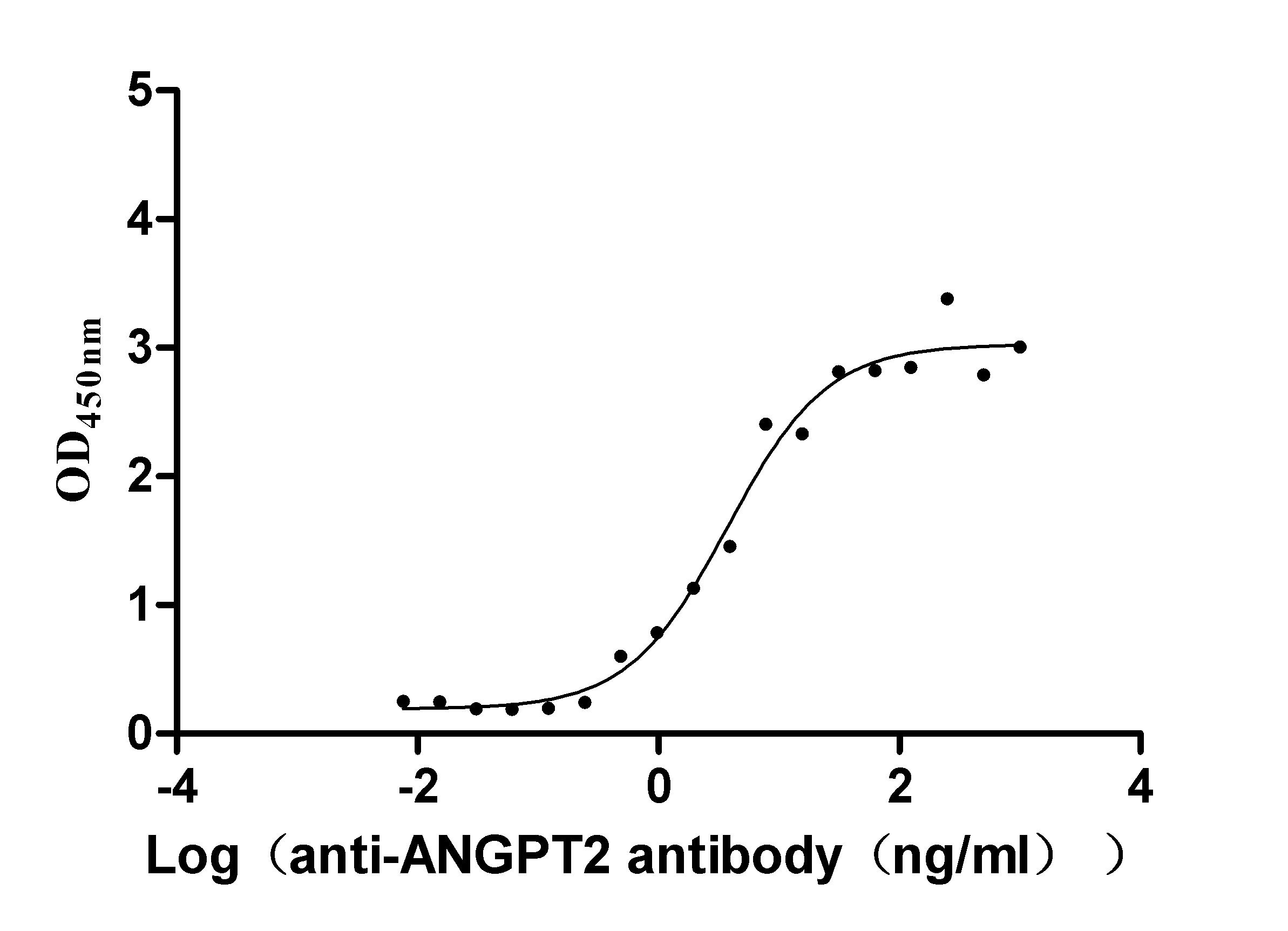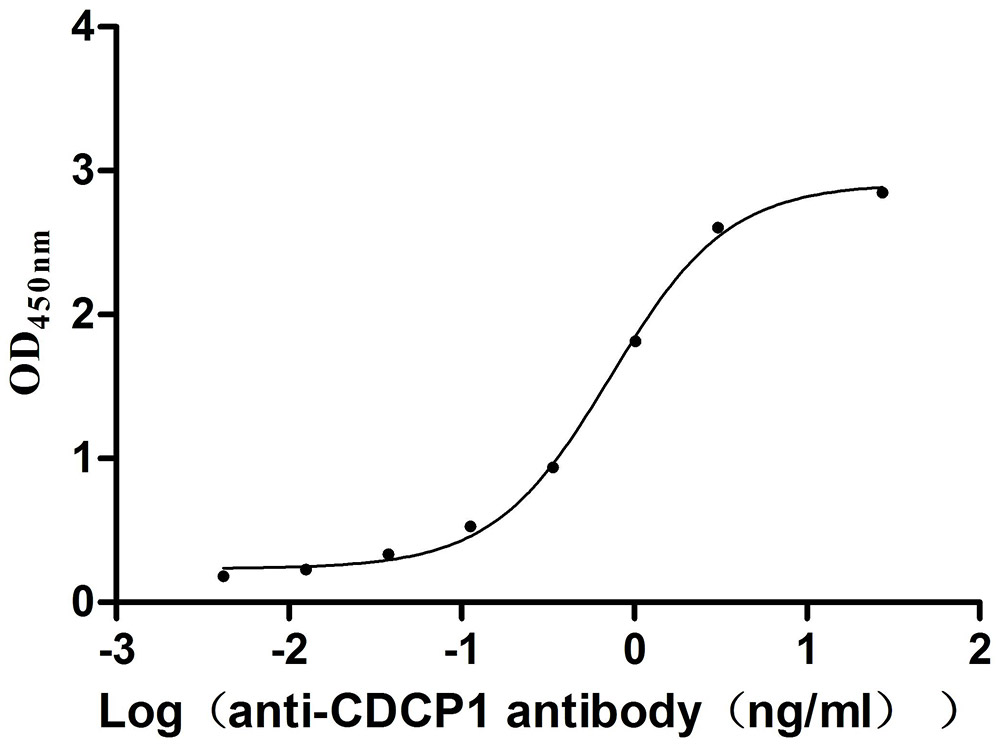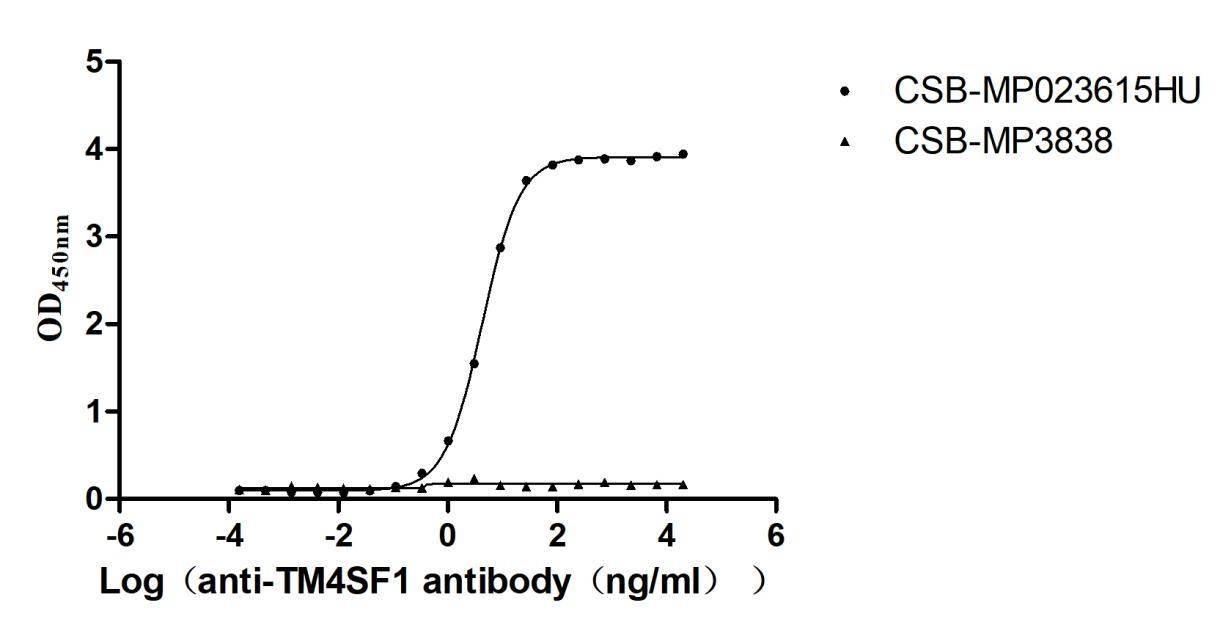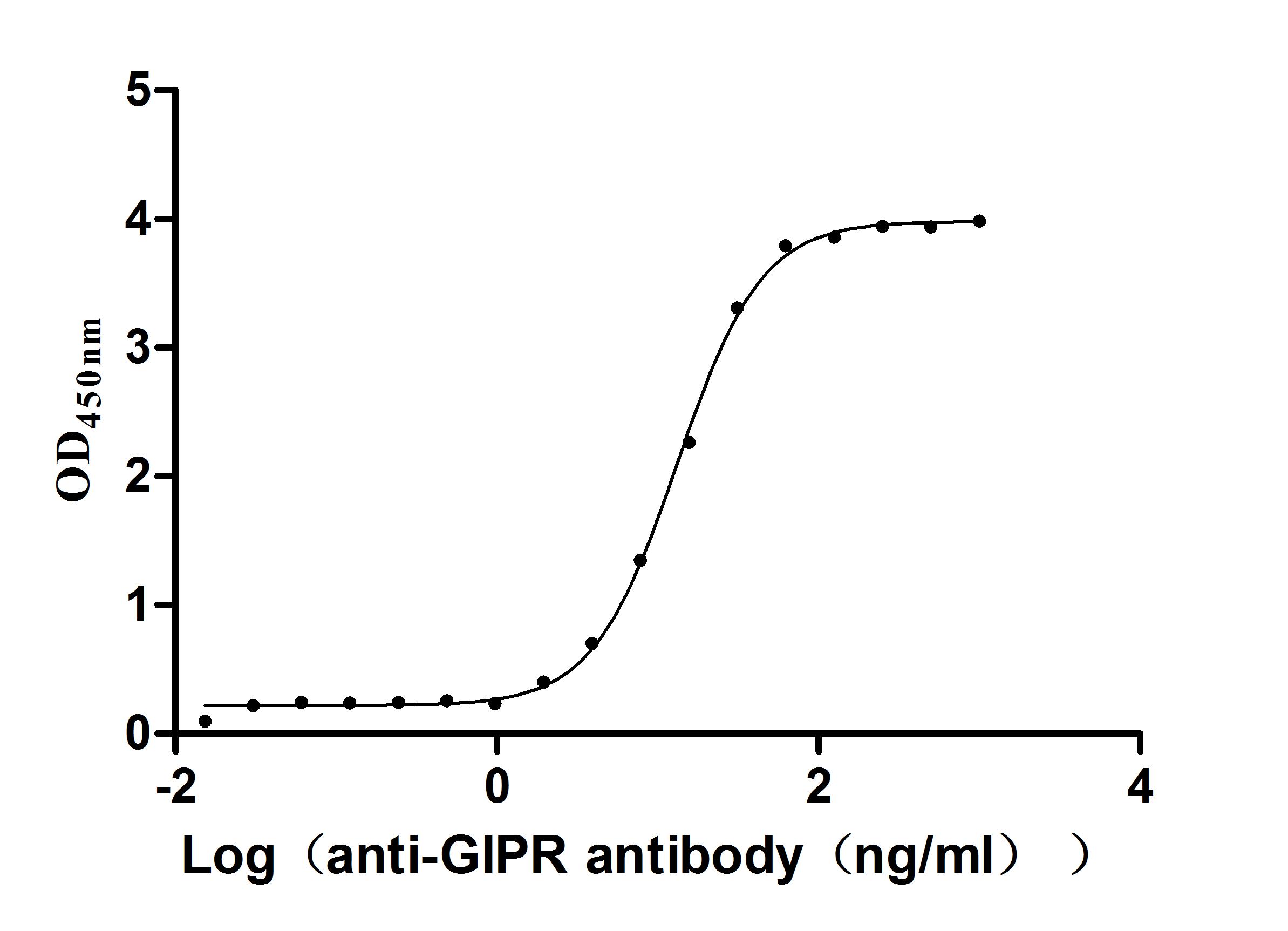Recombinant Mouse Proto-oncogene tyrosine-protein kinase receptor Ret (Ret), partial
-
中文名称:小鼠Ret重组蛋白
-
货号:CSB-YP019572MO
-
规格:
-
来源:Yeast
-
其他:
-
中文名称:小鼠Ret重组蛋白
-
货号:CSB-EP019572MO
-
规格:
-
来源:E.coli
-
其他:
-
中文名称:小鼠Ret重组蛋白
-
货号:CSB-EP019572MO-B
-
规格:
-
来源:E.coli
-
共轭:Avi-tag Biotinylated
E. coli biotin ligase (BirA) is highly specific in covalently attaching biotin to the 15 amino acid AviTag peptide. This recombinant protein was biotinylated in vivo by AviTag-BirA technology, which method is BriA catalyzes amide linkage between the biotin and the specific lysine of the AviTag.
-
其他:
-
中文名称:小鼠Ret重组蛋白
-
货号:CSB-BP019572MO
-
规格:
-
来源:Baculovirus
-
其他:
-
中文名称:小鼠Ret重组蛋白
-
货号:CSB-MP019572MO
-
规格:
-
来源:Mammalian cell
-
其他:
产品详情
-
纯度:>85% (SDS-PAGE)
-
基因名:
-
Uniprot No.:
-
别名:Ret; Proto-oncogene tyrosine-protein kinase receptor Ret; EC 2.7.10.1; Proto-oncogene c-Ret) [Cleaved into: Soluble RET kinase fragment; Extracellular cell-membrane anchored RET cadherin 120 kDa fragment]
-
种属:Mus musculus (Mouse)
-
蛋白长度:Partial
-
蛋白标签:Tag type will be determined during the manufacturing process.
The tag type will be determined during production process. If you have specified tag type, please tell us and we will develop the specified tag preferentially. -
产品提供形式:Lyophilized powder
Note: We will preferentially ship the format that we have in stock, however, if you have any special requirement for the format, please remark your requirement when placing the order, we will prepare according to your demand. -
复溶:We recommend that this vial be briefly centrifuged prior to opening to bring the contents to the bottom. Please reconstitute protein in deionized sterile water to a concentration of 0.1-1.0 mg/mL.We recommend to add 5-50% of glycerol (final concentration) and aliquot for long-term storage at -20℃/-80℃. Our default final concentration of glycerol is 50%. Customers could use it as reference.
-
储存条件:Store at -20°C/-80°C upon receipt, aliquoting is necessary for mutiple use. Avoid repeated freeze-thaw cycles.
-
保质期:The shelf life is related to many factors, storage state, buffer ingredients, storage temperature and the stability of the protein itself.
Generally, the shelf life of liquid form is 6 months at -20°C/-80°C. The shelf life of lyophilized form is 12 months at -20°C/-80°C. -
货期:Delivery time may differ from different purchasing way or location, please kindly consult your local distributors for specific delivery time.Note: All of our proteins are default shipped with normal blue ice packs, if you request to ship with dry ice, please communicate with us in advance and extra fees will be charged.
-
注意事项:Repeated freezing and thawing is not recommended. Store working aliquots at 4°C for up to one week.
-
Datasheet :Please contact us to get it.
靶点详情
-
功能:Receptor tyrosine-protein kinase involved in numerous cellular mechanisms including cell proliferation, neuronal navigation, cell migration, and cell differentiation upon binding with glial cell derived neurotrophic factor family ligands. Phosphorylates PTK2/FAK1. Regulates both cell death/survival balance and positional information. Required for the molecular mechanisms orchestration during intestine organogenesis; involved in the development of enteric nervous system and renal organogenesis during embryonic life, and promotes the formation of Peyer's patch-like structures, a major component of the gut-associated lymphoid tissue. Modulates cell adhesion via its cleavage by caspase in sympathetic neurons and mediates cell migration in an integrin (e.g. ITGB1 and ITGB3)-dependent manner. Involved in the development of the neural crest. Active in the absence of ligand, triggering apoptosis through a mechanism that requires receptor intracellular caspase cleavage. Acts as a dependence receptor; in the presence of the ligand GDNF in somatotrophs (within pituitary), promotes survival and down regulates growth hormone (GH) production, but triggers apoptosis in absence of GDNF. Regulates nociceptor survival and size. Triggers the differentiation of rapidly adapting (RA) mechanoreceptors. Mediator of several diseases such as neuroendocrine cancers; these diseases are characterized by aberrant integrins-regulated cell migration. Mediates, through interaction with GDF15-receptor GFRAL, GDF15-induced cell-signaling in the brainstem which induces inhibition of food-intake. Activates MAPK- and AKT-signaling pathways.
-
基因功能参考文献:
- 7-DHC efficiently supports Ret signaling in vitro. PMID: 27334845
- Results showed that Mn-mediated age-related hearing loss involved a decreased expression and phosphorylation levels of c-Ret in spiral ganglion neurons. PMID: 27824154
- Compromised Survival of Cerebellar Molecular Layer Interneurons Lacking GDNF Receptors GFRalpha1 or RET Impairs Normal Cerebellar Motor Learning PMID: 28591570
- The cardiac GFRA2 signaling pathway is distinct from the canonical pathway dependent on the RET tyrosine kinase. PMID: 27396331
- Ret is essential to mediate GDNF's neuroprotective and neuroregenerative effect in a Parkinson disease mouse model. PMID: 27607574
- Mechanistically, Ret is engaged in a positive feedback loop with Wnt/Wingless signalling, modulated by Src and Fak kinases. PMID: 28899900
- s did not find evidence for genetic interaction between Ret and Sema3d affecting survival, presence of myenteric plexus or intestine transcriptome. PMID: 28334784
- findings uncover a novel spinal circuit that mediates crosstalk between touch and pain pathways and suggest that some early RET positive Dorsal Horn neurons could function as pain "gating" neurons. PMID: 27545714
- Using an organ culture system for prostate development and Ret mutant mice, we demonstrate that RET-mediated GDNF signaling in UGS increases proliferation of mesenchyme cells and suppresses androgen-induced proliferation and differentiation of prostate epithelial cells, inhibiting prostate development. PMID: 28506996
- we described a RET-ER81-Neuregulin1 signaling pathway in neurons innervating Pacinian corpuscle somatosensory end organs, which is essential for communication between the innervating axon and the end organ PMID: 27707970
- These data provide the first evidence for a physiologic role of these isoforms in RET pathway function. PMID: 27226544
- Hox proteins coordinate motor neuron differentiation and connectivity programs through Ret/Gfra genes. PMID: 26904955
- Ret and Gfra2 null mice display comparable early central projection deficits, but Gfra2 null rapidly adapting mechanoreceptors recover later. PMID: 25838128
- Parkin and the RET signaling cascade converge to control mitochondrial integrity and thereby properly maintain substantia nigra pars compacta dopaminergic neurons and their innervation in the striatum. PMID: 25822020
- the Ret signaling pathway is important for podocyte survival and recovery from glomerular injury in vivo PMID: 25587123
- RET coupling to ERK and Akt depends strongly on artemin concentration, and it is highest at the low (~100 pM) artemin levels required for neurite outgrowth. PMID: 25635057
- we analysed non-thermal, atmospheric pressure, plasma irradiation mediated effects in melanocytic tumors which spontaneously developed in HL-RET-mice PMID: 24721948
- the neurotrophic factor receptor RET drives haematopoietic stem cell survival, expansion and function; haematopoietic stem cells express RET and its neurotrophic factor partners are produced in the haematopoietic stem cell environment PMID: 25079320
- TNFR1 exerts a dual role in nociceptor information processing by suppressing TrkA and enhancing Ret signaling in peptidergic and nonpeptidergic nociceptors, respectively. PMID: 24811380
- only the SH3 domains of CD2AP are necessary to enhance the E3 ligase activity of Cbl-3/c toward Ret51 PMID: 24425877
- These data establish mTOR as a key mediator of RET-mediated cell growth in thyroid cancer cells and provide a rationale for combinatorial treatments in thyroid cancers with oncogenic RET mutations. PMID: 23828865
- STAT3 phosphorylation by neurturin was found to be mediated specifically by GFRalpha2c and RET9 isoforms. PMID: 23872421
- SorLA acts as sorting receptor for the GDNF/GFRalpha1 complex, directing it from the cell surface to endosomes. PMID: 23333276
- our data demonstrate that RET/GFRalpha signals are dispensable for thymic T cell development in vivo PMID: 23300832
- This study identifies the proto-oncogene RET as a novel component of the foetal male germ cell development pathway. PMID: 22360967
- Src is a general mediator of selective autophagic targeting of adhesion-linked kinases, and Ret a second FAK-binding tyrosine kinase degraded through autophagy in cancer cells under adhesion stress. PMID: 22732841
- Partial impairment of tyrosine1062-phosphorylation in c-Ret accelerates age-related hearing loss in heterozygous c-Ret Tyr1062Phe knockin mice. PMID: 21612845
- this work demonstrates novel inhibitory roles of RetY1015 and provides a possible mechanistic explanation for some of the confounding broad range phenotypes in individuals with congenital anomalies of kidneys or urinary trac. PMID: 22627285
- The data suggested that Ret protein heterozygosity enhances intestinal adaptation after massive small bowel resection, likely via enhanced epidermal growth factor receptor signaling. PMID: 22421622
- The transcription factor Runx1 controls FXYD2 expression during the maturation of the somato-sensory system, partly through regulation of the tyrosine kinase receptor Ret. PMID: 22253804
- RET9 may be the predominant functional isoform in the olfactory neuroepithelium, while RET51 plays a more selective role in a restricted region of the olfactory neuroepithelial sheet. PMID: 21118713
- Activated Ret protects dopaminergic cell bodies in the substantia nigra pars compacta but does not protect dopaminergic axons in the striatum. PMID: 19767128
- C-cell effects in mice are mediated via the GLP-1 receptor and not associated with RET activation PMID: 22234463
- Study shows that the receptor tyrosine kinase Ret is required for motor axon attraction mediated by ephrin-A reverse signaling. PMID: 22304922
- Results show that Ret is critical for expression of several molecular substrates participating in the detection and transduction of sensory stimuli, resulting in altered physiology following Ret deficiency. PMID: 21395865
- Letter: BMP-4 down-regulates the expression of Ret in murine melanocyte precursors. PMID: 21530183
- caspase cleavage of RET is involved in the regulation of adhesion in sympathetic neurons PMID: 21357690
- SOX9 controls epithelial branching by activating RET effector genes during kidney development. PMID: 21212101
- GDNF-mediated c-RET kinase activation is associated with the pathogenesis of malignant melanoma PMID: 20422010
- Expression of c-Ret (phosphorylated/non-phosphorylated) is differentially expressed in motor neurons and in non-neuronal cells in the lumbar spinal cord of ALS model (G93A transgenic mice vs wild-type mice). PMID: 21283077
- Binding of the transcription factors NXF, ARNT2, and SIM2 to RET depends on the RET polymorphism of Enh2 and affects RET expression and the development of Hirschsprung's disease. PMID: 20977903
- Results implicate Ret/GDNF as a potent pleiotropic factor able to influence pituitary physiology during a period of high plasticity. PMID: 21239429
- Withaferin A is a natural RET-inhibitor with efficacy to treet metastatic medullary thyroid cancer in a murine model. PMID: 21134556
- suppression of budding by BMPs and possibly other factors in non-budded zones of the Wolffian duct may be regulated in part by increased PKA activity, probably partially through downregulation of Ret/GFRalpha1 coreceptor expression. PMID: 20816800
- find that the receptor tyrosine kinase rearranged during transformation (Ret) binds to protocadherins (Pcdhs) in differentiated neuroblastoma cells and is required for stabilization and differentiation-induced phosphorylation of Pcdh proteins. PMID: 20616001
- This study uncovers a conserved interaction between DJ-1 and Ret-mediated signaling and a novel cell survival role for DJ-1 in the mouse. PMID: 20386724
- local degradation of Ret in axons dictates whether GDNF family ligands act as retrograde survival factors PMID: 20392937
- results indicate that enteric neural crest-derived cells death is a principal cause of intestinal aganglionosis in a Ret hypomorphic state, and suggest that the inhibition of cell death is a route to the prevention of Hirschsprung disease PMID: 20392943
- Angiotensin II-induced activation of c-Ret signaling with RAS is critical in ureteric bud branching morphogenesis PMID: 19961928
- Organotypic specificity of key RET adaptor-docking sites in the pathogenesis of neurocristopathies and renal malformations in mice. PMID: 20160347
显示更多
收起更多
-
亚细胞定位:Cell membrane; Single-pass type I membrane protein. Endosome membrane; Single-pass type I membrane protein.
-
蛋白家族:Protein kinase superfamily, Tyr protein kinase family
-
组织特异性:Expressed in peripheral nerve cells, hematopoietic cells and podocytes. Expressed in the brainstem, restricted to cells in the area postrema and the immediately adjacent region of the nucleus tractus solitarius.
-
数据库链接:
KEGG: mmu:19713
STRING: 10090.ENSMUSP00000032201
UniGene: Mm.57199
Most popular with customers
-
Recombinant Human Leukemia inhibitory factor (LIF) (Active)
Express system: Mammalian cell
Species: Homo sapiens (Human)
-
Recombinant Dog Angiopoietin-2 (ANGPT2) (Active)
Express system: Mammalian cell
Species: Canis lupus familiaris (Dog) (Canis familiaris)
-
Recombinant Mouse CUB domain-containing protein 1 (Cdcp1), partial (Active)
Express system: Mammalian cell
Species: Mus musculus (Mouse)
-
Recombinant Macaca fascicularis CUB domain containing protein 1 (CDCP1), partial (Active)
Express system: Mammalian cell
Species: Macaca fascicularis (Crab-eating macaque) (Cynomolgus monkey)
-
Recombinant Human Transmembrane 4 L6 family member 1(TM4SF1)-VLPs (Active)
Express system: Mammalian cell
Species: Homo sapiens (Human)
-
Recombinant Macaca fascicularis Gastric inhibitory polypeptide receptor (GIPR), partial (Active)
Express system: yeast
Species: Macaca fascicularis (Crab-eating macaque) (Cynomolgus monkey)
-
Recombinant Human Tumor necrosis factor ligand superfamily member 15(TNFSF15) (Active)
Express system: Mammalian cell
Species: Homo sapiens (Human)








-AC1.jpg)










